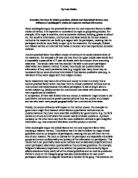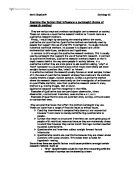In 1897, Emile Durkheim carried out a study on suicide investigating how cultures affect the individual decision to commit suicide. Durkheim studied statistics rather than prying into the lives of individuals, which he believed to be ethical as well as practical as the statistics were easily available and not expensive. He did not need the consent from people as the information was available for everyone to see. He was criticised by ‘bottom up’ theorists who believed that for his study to be more ethical and relevant, he should have tried to interpret the individuals themselves rather than making generalisations from statistics. This shows that Durkheim’s prime thought when choosing a research method were the ethical and practical factors, as he chose a method that was low in cost and easily accessible.
A strong supporter of making research ethical was Max Weber. He defined sociology as the study of social action. He believed that action was social when it takes into account the members in society, he was careful to not affect their behaviour. He tried to understand the meanings and motives behind human behaviour. Weber’s research proved to be ethical as he tried to get interpret those he was studying. To do this, he used a method he called ‘Verstehen’ which meant he had to imagine himself in the position of those who he was trying to explain. This was strongly criticised by Phemomenologists who argued that it is not possible to objectively measure and classify the world. This evidence also supports the claim that a sociologist’s choice of research methods is based mainly on practical and ethical factors, as Weber’s main aim was to make sure his study was as ethical as possible by not affecting his subjects’ behaviour.
The practicality of quantitative methods often attracts many sociologists. Such methods are not as time consuming as others and are often inexpensive due to the shorter length in time. Auguste Comte, a positivist, believed that sociologists should not be concerned with the internal meanings, motives, feelings and emotions of individuals. This itself may explain why they are more likely to research using more practical methods. Positivists use statistical data in order to observe the social world in a more objective way than others. This is also not unethical as they use information that is available to all, as Durkheim did in his suicide study. This shows that ethical and practical factors were the most important aim to achieve for these sociologists when choosing a research method. It was ethical in that the study did not affect the individuals, as well as practical as it was inexpensive and quick.
However, K Sharpe’s study on prostitutes was neither practical or ethical. The aim of the study was to investigate as to why women entered the world of prostitution, their motivation and how they learnt the skills needed to be successful. Sharpe chose for her research to be covert, which in itself was unethical as the women she interviewed could not give their consent to participate in the research. As for practicality, the study would have been difficult as it was likely that many of the women did not want to discuss their lives due to fear or simply to maintain their privacy. This is a strong study to suggest that practical and ethical factors are not the main reasons for a sociologists choice of research method. K. Sharpe obviously had her own motives for choosing such method to study prostitutes, but as her study proves, her reasons were neither for ethical or practical factors, which refutes the claim.
The famous ‘Tea Room Trade’ study [Laud Humphreys] is another example of research that took place without regard for ethical or practical factors. The term ‘Tea Room’ referred to the public toilets by homosexual men in which they met and engaged in sexual activity. It is important to remember that during this time, homosexuality was illegal. Humphrey made the decision to study these activities covertly, which is unethical in itself as stated in Item B. He also noted down registration plates from the mens cars, found out their place of residency, followed them home and then secretly interviewed them without their consent. This shows that Humphrey’s study was certainly not ethical, nor was it practical as it was very time consuming and Humphrey’s would have gone to great lengths to be able to speak to these men. This was illegal [also stated in Item B as a guideline to make sure research is legal], the sociologist studied these people without consent, and deceived those he spoke to. This is a clear argument against the claim that a sociologists choice of method is based on practical and ethical factors as this study is clearly not either.
Correspondingly, Carolyn Hoyle’s study on domestic violence was criticised for not being ethical. Participants were not made aware of who she was, the intentions of the research, how it was funded or how the information would be used. Hoyle lied to her participants in order to gain the information she needed. She interviewed the husbands and wives separately, she told the husbands that they were to be asked the same questions which was untrue. This was deemed unethical as she knowingly deceived her participants. This may be criticised though as some may argue that Hoyle had to lie in order to allow victims to speak freely. Unlike the other studies, this may have been practical as it was not too time consuming and should not have been largely expensive. Although this study may be seen to be practical, it was certainly unethical which also refutes the claim that practical and ethical factors are prime when choosing a research method.
Alternatively, it could be argued that theoretical reasons could be used to explain the choice of research methods used by sociologists. Interpretive sociologists use qualitative methods to gain information. They believe that this is the most practical method of research and argue that it is better to interpret social action that can only be understood by interpreting meanings and motives. Methods used by interpretive sociologists do not deceive participants as they are left to behave naturally. Although this is seen as ethical, it does not take into account the issue of whether the research is covert or overt, if the research is covert it may be argued that it is unethical as the participants are unaware of the research. This argues that it is neither ethical nor practical factors, but perhaps the sociologists own perspective as to how research should be carried out.
Similarly, Symbolic Interactionists reject quantitative statistical data as they believe it does not provide a good insight into human behaviour. Herbert Blummer argues that researchers should grasp the actors view of social reality. He believes it is crucial to understand meanings and interpretations given by the actors before relationships can be made. This is ethical as interactionists do not harm anyone or interfere, however it is not practical as they are more concerned about the best way to gain relevant information rather than its accessibility ease. Whilst this view does support the ethical claim, it does not support the practical claim as it would be extremely time consuming.
The evidence seems to suggest that although ethical and practical factors are extremely important when choosing a research method, sociologists also take other factors into account. A quantitative researcher is very unlikely to use qualitative methods even though they may be better suited, purely due to his own views. Most sociologists have tried to make their research ethical in some form or another, and even when studies have been unethical there have been reasons for this such as the use of covert research. It is therefore more likely that research is to be more practical than ethical as researchers will not want to waste time or money. There is little excuse for being unpractical. Some researchers may strive for their research to be high in validity and reliability rather than it being ethical or practical. Overall, evidence shows that ethical and practical factors are not the prime reasons behind a sociologists motives for a particular research method.







